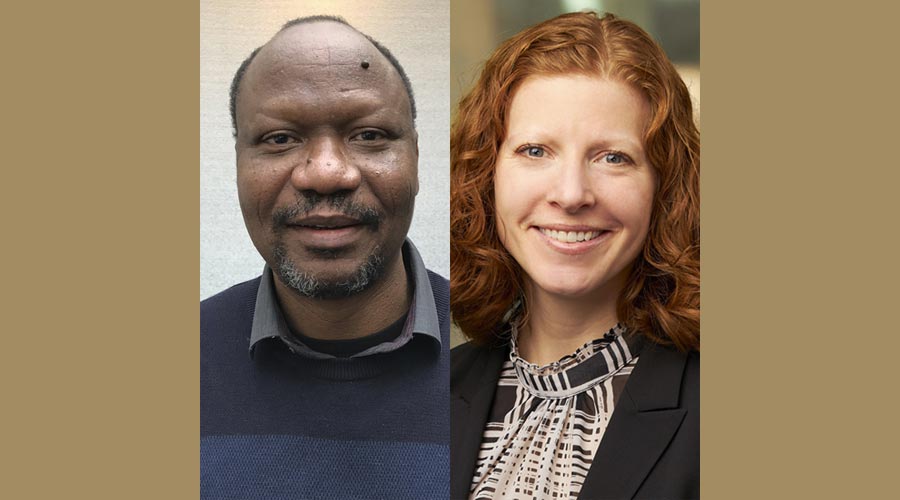On Nigeria Co-Directors Kole Shettima and Erin Sines discuss the priorities of community collaboration and considering gender and disability in anti-corruption work in Nigeria.
In October 2022, our team had the pleasure and honor of hosting the first in-person On Nigeria grantee meeting since 2019. We experienced every emotion imaginable: gratitude, anxiety, happiness, elation. There were so many times over the past three years that it felt like we might never be able to gather safely again. And yet, we were there, sharing meals, sitting next to each other, catching up. We were struck by how the work and the On Nigeria program had matured since our last physical gathering. Ideas that once only existed in proposal stories were now full-fledged programs serving people.
This experience made the program’s planned end date of December 2024 feel closer than ever. It motivated me to see how much more we can do before the program ends. Over the next two years, the Foundation will continue to use all available resources to help our grantee partners strengthen and diversify the accountability ecosystem in Nigeria. This ecosystem, comprised of civil society, media, community members, and government partners, is crucial to Nigeria’s anti-corruption and pro-accountability movement, as well as civic space, democracy, development, human rights, and the rule of law. A diverse accountability ecosystem ensures that the aspirations and needs of the most marginalized – women, youth, children, people with disabilities, and other commonly excluded groups – are recognized and prioritized by all partners.
Building and maintaining this vibrant ecosystem of accountability requires partnerships, collaboration, and information sharing.
Building and sustaining this thriving accountability ecosystem requires partnerships, collaboration, and information sharing. On Nigeria’s group of grantees is founded on the idea that when like-minded organizations align their efforts and, where necessary, form demand-driven partnerships, they can accomplish more together. In meetings, grantee partners consistently told us they wanted more opportunities to get to know each other, interact, and strategize their work together. New analysis by our evaluation and learning partner, EnCompass, showed that while grantees collaborate and work with a range of other partners, there is room to deepen those connections. Because the On Nigeria team cannot always convene partners, we still have work to do to strengthen, deepen, and diversify our ecosystem so that it continues to thrive beyond the life of the program.
We also feel a sense of urgency around our Gender Equality and Social Inclusion (GESI) goals and values. Last year, we outlined our GESI efforts and shared some updates on what we’ve learned along the way. Our team continues to strengthen our own GESI skills and provide resources to our grantee partners so they can prioritize justice and equality in their work.
Focus on disability rights
Unlike gender, the disability rights agenda is still in its infancy in Nigeria. Estimates suggest that about 29 million Nigerians live with some form of disability, be it visual, hearing, physical, intellectual or communication impairment. According to an internal report commissioned by our team and based on a 2019 disability study by Eskay et al., “poor women with disabilities are more likely to encounter disabilities than men with disabilities as multiple issues intersect to intensify their vulnerability”. Several studies have found that people with disabilities are more likely to face corruption in the health, education and social welfare sectors. They also face corruption in the police, judiciary and land management authorities. Despite the passing of the 2018 Anti-Discrimination Act, people with disabilities continue to be excluded from economic opportunities, with less than 1% employed in the formal sector and less than 2% receiving education. According to the National Development Plan 2021-2025, more than 96% do not have access to assistive devices. It is clear that people with disabilities face significant barriers to participating in governance, anti-corruption and many other aspects of public life.
We also feel a sense of urgency around the ambitions and values of gender equality and social inclusion.
Given that the disability rights agenda in Nigeria is still in its infancy, we are grateful for the work that many of our grant partners are doing, from ensuring that people with disabilities have the facilities they need to vote to advocating for the inclusion of people with disabilities in the Open Government Partnership Strategy.
Stallion Times, an On Nigeria grant recipient, trained journalists on how to report fairly and accurately about people with disabilities. Cable Nigeria is redesigning its website to make it accessible to people with visual and hearing impairments. At a recent Social Influencer Week hosted by the Information Technology Development Centre, panellists spoke about techniques to increase voting participation among people with disabilities. St Ives Media (Women FM) organized a presidential debate where candidates outlined their gender policies and members of the disability community spoke about the needs and aspirations of women with disabilities.
Our teams are also working more consciously to put people with disabilities at the centre through including representatives from the disability community on the panels we host and on the committees on which we sit, supporting the National Coalition of People with Disabilities, and supporting the Gender and Social Inclusion Unit of the Independent National Electoral Commission. While there is still much to do, our partners have made incredible progress in just a few years, and we look forward to continuing to learn from them and following their lead.
We recently sent out a survey to our grantee partners asking them what they expect and need from us over the final two years. We rely on their honest feedback and leadership and look forward to continuing to work together in the future.
About Nigeria Grants ›
About the Nigeria Strategy ›
Other Directors’ Perspectives ›

